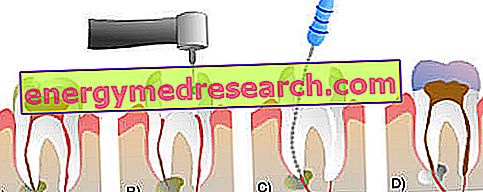Apicectomy: key points
Apicectomy is the first choice surgical procedure for the treatment of non-curable dental granulomas through simple devitalization (canal filling).
Precisely, apicectomy involves two basic steps:
- Removal of the apex of a tooth root severely infected with bacteria
- Filling of the open root cavity with a biocompatible material (retrograde dental seal)
Terminology
- Dental granuloma: chronic inflammation of the root apex of a tooth
- Dental root: section of the tooth inserted into the alveolar bone, inside which is contained the dental pulp (the vital part of a tooth)
- Apex of a root: the point from which nerves and blood vessels access the tooth
- Root canal: the canaliculus within the root, in which nerve fibers and blood vessels flow


Apicectomy is mainly performed to permanently seal the root canal from the apex, negating any possible and possible access to the bacteria.
Despite being a rather invasive intervention, apicectomy is not particularly painful and should always be performed under local anesthesia.
Why do you run it?
Performed in conditions of extreme gravity, apicectomy is aimed at treating important chronic inflammations in the root apex of a tooth (eg granulomas) and dental abscesses.
To completely heal, a granuloma requires surgical treatment: in general, devitalization is sufficient to completely remove the infection. However, the granuloma must undergo apicectomy when the tooth - for anatomical or pathological reasons - cannot be devitalized.

A sick tooth cannot be devitalized in the following circumstances:
- The infected tooth has already been devitalized and cannot be reprocessed
- The root canal of the damaged tooth is obstructed by a non-removable pin
- Inability to reach the root canal with surgical instruments normally used during a devitalization
- The tooth affected by granuloma is encapsulated
- Very tortuous and curved root canal
The only alternative to devitalization for the treatment of granulomas is therefore apicectomy. Only in extremely serious cases, where the infected tooth cannot be treated either with apicectomy or even with devitalization, dental extraction is the only (and extreme) solution that can be thought of.

Indications
In addition to the treatment of granulomas and dental abscesses, apicectomy can be performed in the event of:
- Rupture / severe trauma of a tooth root
- Dental cysts
- Perforation of the root
- Unbearable toothache not curable with other endodontic treatments
- Persistent dental symptoms that do not indicate any morbid X-ray phenomenon
On which teeth can you perform?
Contrary to what one might believe, apicectomy can be performed on both frontal and molar teeth. Clearly, such an intervention performed on incisors or canines is faster and faster because the teeth have only one root canal. Apicectomy operations in the molars, on the other hand, present a higher difficulty due to the higher number of root canals.
If the tooth affected by granuloma is a wisdom tooth, extraction is recommended.
Is apicectomy painful?
Apicectomy is performed on an outpatient basis, under local anesthesia. Thanks to the improvement of the anesthetic procedures, the removal of the granuloma by apicectomy is almost painless. Clearly, since it is still a surgical procedure, in the days following the operation the tooth may be more sensitive than the high healthy teeth, especially the temperature changes.
Preparation for apicectomy
Before apicectomy, consultation and specialist consultation with your trusted dentist are inevitable. To determine whether the apicectomy operation is necessary or not, the doctor must ascertain the state of health of the tooth and carefully assess the lesion with the aid of radiographic (X-ray) studies.
The duty of the doctor is to explain to the patient exactly what the procedure consists of, informing him of the possible risks and complications.
It is recommended to always inform the doctor in the presence of allergies to drugs or materials (eg latex allergy, nickel allergy), illnesses (past or current) and any pregnancy (presumed or in progress). Furthermore, it is equally important to report to the dentist if you are taking medication for a given disease.
A few days before apicectomy, the patient should follow a precise precautionary scheme to minimize post-intervention risks.
Below are the standard guidelines to be put into practice before the operation:
- Support the normal cleaning of the oral cavity with rinses of medicated mouthwashes with disinfected action (eg chlorhexidine). Start the treatment 3-4 days before apicectomy
- Taking an antibiotic a day before (or two days before) apicectomy can prevent infection in the immediate post-surgery. The antibiotic requires a medical prescription
- Take an anti-inflammatory drug at least a couple of hours before undergoing apicectomy: this advice can help reduce the pain and inflammation that occur after surgery, as soon as the anesthesia wears off
Before proceeding with apicectomy, it is necessary - as well as essential - to always address all doubts, concerns and uncertainties to the dentist.
Apicectomy: execution and post-intervention »



